#sewers digression
Explore tagged Tumblr posts
Text
It's amusing how Hugo portrays the sewers as a terra incognita, implying that the sewer system somehow emerged naturally and remained unknown until 1805 (but he will write about the history of sewers in the next chapters).
He provides such a detailed description of the filth inundation of 1802 that I immediately wanted to see how it correlates with the map of Paris (there are many good maps available of the Paris sewer system). Then there's the intricate description of sewer openings from which various pestilences were believed to spread. And when I read this "The popular imagination seasoned the sombre Parisian sink with some indescribably hideous intermixture of the infinite," it reminded me of the Infinite from the convent digression, and I couldn't help but start giggling.
And now, a man ironically named Bruneseau is about to venture into the sewers. I'm intrigued.
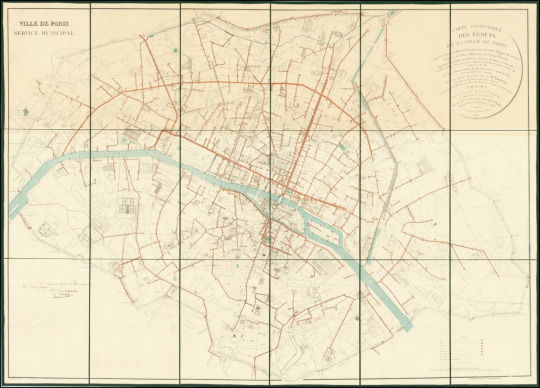

70 notes
·
View notes
Text
OP: Check out. The fully-sexual charged cinematic movement design.
Cnetizens: How did the director come up with the idea to have him kneel on a playing card, adding so much aesthetic energy, is that some kind of genius?

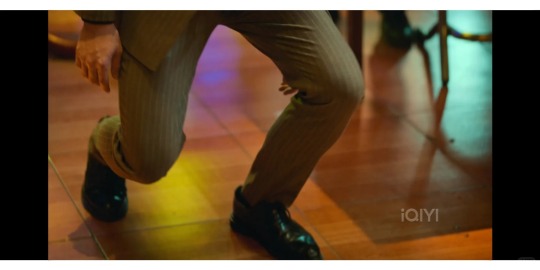
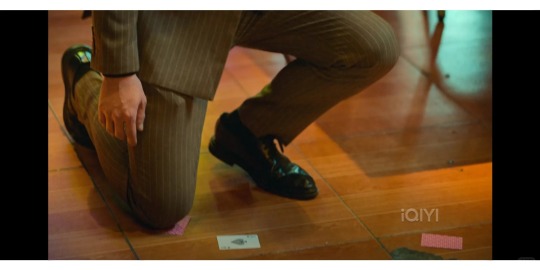
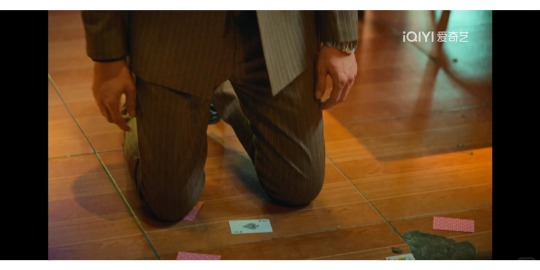
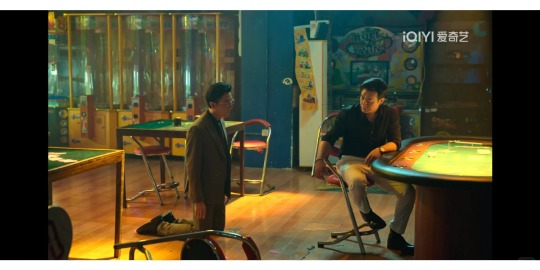
#china#cdramas#dramas#lmao#They are siblings and they're discussing serious matters#this scene is actually rather heavy because the younger brother is involved in drug trafficking#carrying more than 50 grams of heroin will result in a death sentence in china let alone being involved in drug trafficking#the older brother is a gangster king#but even he doesn't dare to get involved in the drug business because it will bring about the demise of his family#sorry for digression I mean how did the director make this scene which has absolutely nothing to do with sex#so sexually charged?#btw there're many posts with rich information about China's crackdown on drug crimes on xhs and douyin#especially about how the four major drug-trafficking families in Myanmar were wiped out overnight#they buried undercover Chinese counter-narcotics police alive and kidnapped and brutally excuted civilians#so if you're interested you can go with the key words 缅甸四大家族覆灭 on xhs and douyin#cnetizens' views on drugs are related to modern Chinese history#the first chapter of modern history in high school textbooks is the opium wars#There's a very dark joke on xhs about which country in the world would least like China to withdraw from the P5#and the answer is the UK#because it's in the first chapter of China's modern history#the Destruction of opium at Humen in 1839#no offence but Breaking Bad can't last for more than one episode if it happens in china because of the sewer detection technology#they can detect the tiniest amount of drugs in feces in a body of water the size of a lake for up to six months#which can be quickly locked down to neighbourhoods and portals#Once a foreigner was caught smuggling and selling 222.035 kg drugs in China and sentenced to death with two other Chinese associates#his country's prime minister asked for his extradition#cnetizens commented that there was an opium war and he still dare to come to China to sell drugs be like 找死court death#All the above information is to explain the gangster king's attitude towards his brother's drug business
201 notes
·
View notes
Text
Live footage of me suspending my disbelief and trying to figure out what symbolism Vicky is aiming for while he talks about using human feces to fertilize fields:

#Vicky. Vicky. Vicky there is a Very Good Reason everyone knows not to use human poop to grow food.#it's called Hep A Vicky#it's cholera-flavored Vicky#People will DIE Vicky#les mis#shitposting through les mis#literal edition#shitposting @ me#also more literal than usual#sewer digression#parisian sewer system#parisian sewage system
17 notes
·
View notes
Text
SEWERS DIGRESSION !!!!!!!
#my best friend the sewers digression!!!!! I'm so excited one of my favorite parts of the book fr#yay yippee#thoughts
16 notes
·
View notes
Text
“a man disappeared suddenly”
The sewers are terrifying!
Disease is not a new metaphor for social problems in general or within the context of this novel, nor are elements of horror. But I do feel like the sewers are particularly well-suited to this, partly because they are literally so closely tied to disease (especially cholera) and because they’re suspenseful in a different way? Hugo’s playing on the unknown aspect, of course, but I do think the un-thought-of dangers of the sewers - like fungi, falling in, and other problems - are especially scary.
Social commentary is also present: it’s no surprise that the sewer is tied to prison, given all that we’ve learned about the horrors of French prison. The animal also gives a sense that the sewer is for the “lost,” literally in this case, but also metaphorically for those cast out from society.
I don’t know a lot about Marat, but I would love any additions!
I think it’s important to note that these explorations were firmly Napoleonic. They were centralized, reflecting the expansion of the state’s power, but they also touched on something that affected ordinary people, highlighting the aftereffects of the French Revolution. The Napoleonic structure couldn’t have reformed this system, but it was a start, just as Hugo doesn’t want to completely abandon what he respects about the Napoleonic era even if he doesn’t want a Napoleon.
Spoilers below:
I’d be remiss not to point out that explaining Bruneseau’s tactics to explore the sewers will help us understand Jean Valjean’s later on. As funny as digressions are, this one not only serves a thematic purpose, but a plot one. Knowing the structures of the sewers and the challenges in moving through them just a few decades earlier gives us a good sense of what Valjean is facing.
24 notes
·
View notes
Text



Carver's really come a long way since, "So... you're not like a lot of other girls."
#carver hawke#rook carver hawke au#veilguard spoilers#dav#tbh i have no idea who he's gonna romance#i think he'd work with bellara harding or neve... i think taash might be a bit intense for him haha#emmrich's necromancy is gonna freak him out a little sksks like yeah at this point he's seen some shit so sure why not wake the dead#but i don't think they'll match each other's freak#i've already romanced davrin and lucanis so i kinda wanna steer away from them like carver and davrin are definitely gonna be bros#and lets be real carver's gonna bring back the friendship/rivalry system for lucanis alone haha#even though YES i see the irony and how fucking funny it would be for carver to spend all of da2 telling his brother#'stop flirting with the abomination in the sewers you stupid idiot' only to end up with a guy with a spirit of spite in him#but i digress haha
5 notes
·
View notes
Text
please god take all the hate the sewer digression gets and give it to the bit about louis-phillipe
#it’s always “down with the monarchy” until you personally know the monarch#fake ass republican enjolras would have had you shot#anyway ily the sewer digression#les mis#les misérables#victor hugo#the brick#mine
5 notes
·
View notes
Text

THE SEWERS!!!
#CANNOT WAIT TO GET TO THE SEWERS DIGRESSION. YPU HAVE NO IDEA#I love you sewers of paris ❤️❤️❤️❤️❤️❤️❤️❤️❤️#mina watches iwtv
5 notes
·
View notes
Text
finally saw the barbie movie !! no spoilers here but if you haven't seen it, you definitely need to, it's so good ✨
#saw it with my mom and my sister and brother#and u best bet the four of us were showin up in matching pink outfits!#and posed in the barbie box ofc#(and also with a teen.age mutant ninj.a turtle display where we pretended we were coming out of the sewer)#but i digress
8 notes
·
View notes
Text
Edward Said: orientalism was used in fiction to highlight and contrast the differences of the supposed east and west
me: oh yeah like with victor hugo
Said: [...] such as Victor Hugo
me: aYY
#love being on the same page Said#argot digression lovers dni#sewer and convent digression lovers are fine but still
2 notes
·
View notes
Text
Ok yes, permets-tu and fangirl flailing, but can we talk about how the National Guard briefly thought Enjolras was just too pretty to be shot?
#yes i just listened to That Part#and now i'm on to the Sewer Digression i've heard so much about#yay i guess?#les misérables
2 notes
·
View notes
Text
The best part of today's chapter: "This network of cellars has its immemorial population of prowlers, rodents, swarming in greater numbers than ever; from time to time, an aged and veteran rat risks his head at the window of the sewer and surveys the Parisians; but even these vermin grow tame, so satisfied are they with their subterranean palace."
#les mis letters#lm 5.2.5#les miserables#sewers digression#this aged and veteran rat reminds me of jean valjean's way of life
24 notes
·
View notes
Text
No, but the sewer digression is important! It's thematic!
It makes so much sense to juxtaposition the revolution with the sewer digression. Because a good sewage system is vital for public health. Before sewers, drinking water wasunsafe and cholera wiped out tons of people each year. It was just a fact of life (much like it is here in Appalachia) -- you get sick, you die. It's inevitable.
But sewers carry your wastewater safely away. They prevent public outbreaks of cholera and yellow fever and other waterborne illnesses. The suffering and death associated with these diseases doesn't have to be inevitable. We, as a society, have and can do something about it.
That brings us back to the Les Amis, the literary representations of real revolutionaries that Hugo personally witnessed. They were fighting for a more equal world -- for the poor, the sick, unwed mothers, sex workers, orphaned children, and former prisoners -- all the kinds of people that Hugo introduces us to. The Les Amis were heavily outnumbered, and their deaths were inevitable. How could they fight against a system rigged against them? They go to their deaths anyway, because all of those ideals, all of those people, are worth dying for.
The Les Amis die trying to bring about change to prevent unnecessary suffering and death, because death from starvation and disease doesn't have to be inevitable. The sewers are standing proof of that, and of hope that progress will continue slowly but surely. The Les Amis lost the battle, but they didn't lose the war. Things are going to get better, because people are going to keep fighting for it.
The past few chapters of Les Miserables featured a history lesson on the sewers of Paris and the monetary value of shit
Nobody:
Victor Hugo after killing off many beloved characters in the name of the revolution and putting Valjean and Marius in a dangerous situation: Lemme get these sewer facts to the people real quick
#les mis#sewer digression#victor hugo#i know making fun of the digressions is good fun#but i feel very deeply about this book#i love the digressions#they tie into the themes if not the 'plot' as it were#also 100% adhd core#there's a point i swear#just let me get to it
107 notes
·
View notes
Text
I just think that if I ended my twenty-page essay with
We might say that, for ten centuries, the cloaca has been the disease of Paris. The sewer is the taint the city has in her blood. The popular instinct is never mistaken. The trade of sewerman was formerly almost as perilous, and almost as repulsive to the people, as the trade of slaughterer, so long held in horror and left to the executioner. It took high wages to persuade a mason to disappear in that fetid ooze; the well-digger's ladder hesitated to plunge into it; it was said proverbially, "to descend into the sewer is to enter the grave"; and all manner of hideous legends, as we have said, covered this colossal drain with terror; awful sink, bearing the traces of the revolutions of men, and in which we find vestiges of all the cataclysms from the shellfish of the deluge down to Marat's rag.
I might have a "SEE ME" underlined somewhere underneath.
#now should we be grading this based on high school informational essay/creative writing criteria? of course not#but even just copying this over I was seeing the [citation needed] hyperlinks behind my eyelids#okay grandpa tell me more about that strong old man and his young unconscious captive#les mis#sewer digression#shitposting @ me#shitposting through les mis#parisian sewage system#parisian sewer system
14 notes
·
View notes
Text
The sewer! It’s here!!
(I fully admit to being a fan of the sewer digression).
Hugo’s framing of the fact about the Chinese peasant has some racist elements (“to our shame”), but it also serves as an important framing device for the sewers as a whole: they represent waste in not only a literal sense, but the waste of the poor and the marginalized by a society that does not value them. China benefits from the peasant’s knowledge, recognizing that “manure” is “gold;” France wastes this.
This paragraph is also just beautiful:
“Those heaps of filth at the gate-posts, those tumbrils of mud which jolt through the street by night, those terrible casks of the street department, those fetid drippings of subterranean mire, which the pavements hide from you,—do you know what they are? They are the meadow in flower, the green grass, wild thyme, thyme and sage, they are game, they are cattle, they are the satisfied bellows of great oxen in the evening, they are perfumed hay, they are golden wheat, they are the bread on your table, they are the warm blood in your veins, they are health, they are joy, they are life. This is the will of that mysterious creation which is transformation on earth and transfiguration in heaven.”
I don’t know how accurate Hugo’s statistics are, but his general point about waste and disease certainly rings true. I’ve mentioned this before, but 1832 was the year of a cholera pandemic, and while it wasn’t known that cholera is spread through contaminated water at that time, it’s possible that Hugo was aware of such theories. And even if he was not, miasma theory – which posited that things like bad smells caused disease – was a really common theory in the 19th century and still would have led to concerns over waste disposal.
As for the Thames, as London (a sad city to Hugo because it’s sewer-less) grew dramatically in the nineteenth century, its challenges with waste disposal increased. Many of these issues paralleled problems in Paris, like the spread of cholera and pollution, but some were more specific to a city without a sewer (as there was nowhere for waste to go). Parliament eventually acted when the stench of the Thames got so bad that it was noticeable during its sessions.
I also love how Hugo is both really enthusiastic about sewers (he is choosing to write about them, after all) and really judgmental about them. He seems to say: “really? We’re spending this much on sewers?” While he is arguing that the waste that goes through sewers is valuable, he also seems to realize that his topic of choice here is a bit unorthodox, thus pointing out that this wealth could be spent on vague “splendors” instead. What these “splendors” are, of course, seem concrete – feeding the people by using manure to fertilize fields – but this aspect of the digression might have helped him appeal to middle- or upper-class audiences.
And of course, the link to Rome serves as a warning of the urgency of this issue. Rome was linked to greatness, but also to collapse; the Roman Empire fell, and Hugo’s implying that France could face the same fate without sewer reform.
22 notes
·
View notes
Text
Being Purple ○ Part Two
Rise Ramblings #315
Previous | Being Purple ○ Part One This post is a continuation, so I recommend reading Part One before reading this Part Two. ••••
We’ve talked about what Donatello was and his role in the family.
But, we never examined why. Why is Donnie so gung ho on physically providing for his family?
Well, to understand why he feels that way, we need to go back to the beginning. After Splinter and the turtles were mutated, Yoshi was obviously unable to access any of the funds or resources he held as Lou Jitsu due to, you know, him now being a giant rat. He had to start life a new from the bottom of society.

We don’t know what happened during their time on the streets, but we can make some inferences as to what happened next. Splinter eventually moved the boys down into the sewers and was able find a comfortable space for himself and his little family.
Here is where I’m going to try my best to piece together the order of events regarding Donatello’s earliest contributions. I’ll be using two episodes: the season one finale, “End Game,” and the Nick web exclusive mini-episode, “Turtle Tots.”
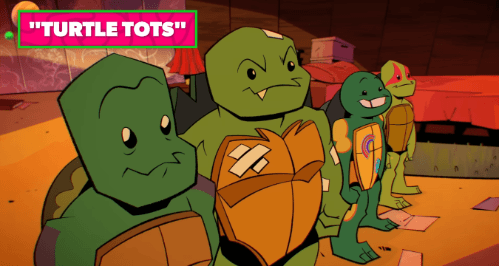
In Turtle Tots, the family has gathered in Splinter’s room. We can also see the den through Splinter’s doorway. This home is, indeed, the home that we are familiar with in the show. Thus, we now know that at this age the boys were already living in the sewers. We also know that the den has already been outfitted with a tv, electricity, and probably some kind of cable hookup.
Is it possible that Splints did this electrical work all on his own? “End Game” gives us a clue that can lead us to an answer.
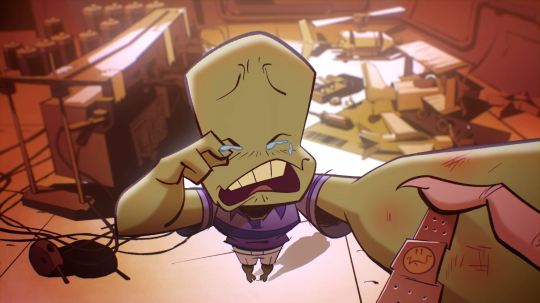
Here he is, the boy of the hour. In this picture, given the perspective, young Donnie is much shorter than Splinter. Their heights here are actually comparable to their height difference in the “Turtle Tots” clip. Therefore, I believe it’s fair to conclude that Donatello is about the same height in both instances, and likewise, relatively the same age.
Given that new piece of information, now we can speculate further.
When you look at the room that crying Dondon is in, he’s surrounded by wires, batteries, boxes, and what appears to be little bits of tech that he was working on, hence the booboo. There’s a small rotary plane of some sort, a tiny workbench, and other bits and pieces. So, we can deduce that Donnie is familiar with electrical work and is building things for himself, even at this young age.
Donatello is already cooking.
With that evidence, I believe it’s reasonable to surmise that Donatello had a hand in hooking the den up with a refurbished TV and in wiring the house with electricity, which is such a big job for such a little guy.
If it had stopped there, I wouldn’t bring it up, but as we can plainly see…
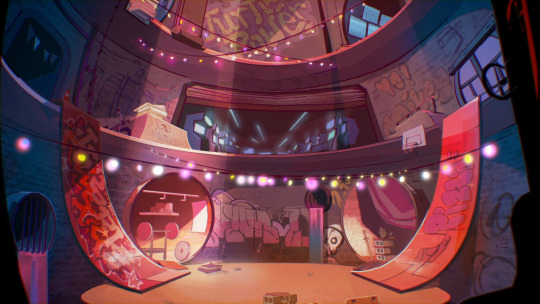
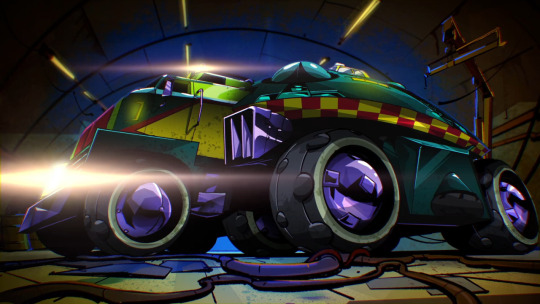
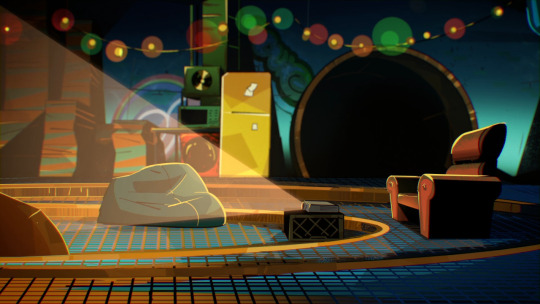


It never stopped. His labors are endless. Everything from the turtles’ transportation, their living space, and their comforts at home was created, built, enhanced, and refurbished by Donatello. Consequently, he internalized the idea that his usefulness equated to the safety and security of his family. And that’s just how he lived his life.
He doesn’t know any different, and I’m sure at this point he wouldn’t want any different. This is his role. This is his place. Besides, his beneficence makes his brothers happy, and his father happy, and by extension it makes him happy.
Hence, his “gift giving” love language.

If Donnie is happy, then where’s the problem?
I’m sorry, but external validation as a primary source of happiness, or even worse, as a source of self-esteem, is dangerous…
But I digress…
From the outside looking in, it’s easy to assume that his genius is best utilized as a tool for the team’s benefit. But as a child, the weight of ensuring their entire family’s physical infrastructure is a large burden to bear…and it is almost the exact definition of Instrumental Parentification.
Parentification is a process in which a role reversal occurs where the child or adolescent is obligated to act as a parent would to their siblings or to their actual parent. Instrumental Parentification involves a child assuming the responsibilities of maintaining a household through physical means. In this case, Donatello literally maintains the household.
I’ve said all of that to say this.
Donatello has been subjected to Instrumental Parentification for almost his entire life. He doesn’t know life without providing for his family, but he’s happiest when his family is comfortable and safe.
So when we ask, why does Donatello make these sacrifices for his family, the answer is obvious. Love. And that answer reigns true in the past, present, and future…
Anyways, Donatello is such a complex and intriguing character, I could go on about him forever. But I think this as good a place as any to put a pin in my deep dive on this fiery little grape, because our next dive’s focus is on the true pinnacle of the Hamato clan…

○○○○
Previous | Being Big Red • Being Baby Blue • Being Purple ○ Part One
Next | Orange, Baby!
Finale | Being Hamato Yoshi
#All right Angelo you're up!#starkiss ramblings#research resources provided upon request#rise analysis#rottmnt analysis#character analysis#Donatello Ramblings#rise don#rise donnie#rise donatello#donatello hamato#rottmnt donatello#donatello#rottmnt#tmnt#teenage mutant ninja turtles#rise of the teenage mutant ninja turtles#rise of the tmnt#tmnt2018#tmnt 2k18#tmnt 2018#save rottmnt#unpause rottmnt#unpause rise of the tmnt#save rise of the tmnt#save rise of the teenage mutant ninja turtles
690 notes
·
View notes